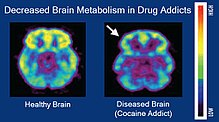
Back Verslawing Afrikaans Abhängigkeit (Medizin) ALS Adicción AN إدمان Arabic بلية ARY ادمان ARZ আসক্তি Assamese Adicción AST Addiksiya Azerbaijani اعتیاد AZB
| Addiction | |
|---|---|
 | |
| Brain positron emission tomography images that compare brain metabolism in a healthy individual and an individual with a cocaine addiction | |
| Specialty | Psychiatry, clinical psychology, toxicology, addiction medicine |
| Symptoms | Reoccurring compulsion to engage in rewarding activity despite negative consequences |
| Risk factors | Family history, adverse childhood experiences, attention deficit hyperactivity disorder |
| Treatment | Cognitive behavioral therapy, behavior modification, medication |
Addiction is a neuropsychological disorder characterized by a persistent and intense urge to use a drug or engage in a behavior that produces natural reward, despite substantial harm and other negative consequences. Repetitive drug use can alter brain function in synapses similar to natural rewards like food or falling in love[1] in ways that perpetuate craving and weakens self-control for people with pre-existing vulnerabilities.[2] This phenomenon – drugs reshaping brain function – has led to an understanding of addiction as a brain disorder with a complex variety of psychosocial as well as neurobiological factors that are implicated in the development of addiction.[3][4][5] While mice given cocaine showed the compulsive and involuntary nature of addiction,[a] for humans this is more complex, related to behavior[6] or personality traits.[7]
Classic signs of addiction include compulsive engagement in rewarding stimuli, preoccupation with substances or behavior, and continued use despite negative consequences. Habits and patterns associated with addiction are typically characterized by immediate gratification (short-term reward),[8][9] coupled with delayed deleterious effects (long-term costs).[4][10]
Examples of substance addiction include alcoholism, cannabis addiction, amphetamine addiction, cocaine addiction, nicotine addiction, opioid addiction, and eating or food addiction. Behavioral addictions may include gambling addiction, shopping addiction, stalking, internet addiction, social media addiction, video game addiction, and sexual addiction. The DSM-5 and ICD-10 only recognize gambling addictions as behavioral addictions, but the ICD-11 also recognizes gaming addictions.[11]
- ^ Heather N, Best D, Kawalek A, Field M, Lewis M, Rotgers F, et al. (4 July 2018). "Challenging the brain disease model of addiction: European launch of the addiction theory network". Addiction Research & Theory. 26 (4): 249–255. doi:10.1080/16066359.2017.1399659. ISSN 1606-6359.
- ^ a b Heilig M, MacKillop J, Martinez D, Rehm J, Leggio L, Vanderschuren LJ (September 2021). "Addiction as a brain disease revised: why it still matters, and the need for consilience". Neuropsychopharmacology. 46 (10): 1715–1723. doi:10.1038/s41386-020-00950-y. ISSN 0893-133X. PMC 8357831. PMID 33619327.
pre-existing vulnerabilities and persistent drug use lead to a vicious circle of substantive disruptions in the brain that impair and undermine choice capacities for adaptive behavior, but do not annihilate them.
- ^ Cite error: The named reference
Cellular basiswas invoked but never defined (see the help page). - ^ a b "Drugs, Brains, and Behavior: The Science of Addiction – Drug Misuse and Addiction". www.drugabuse.gov. North Bethesda, Maryland: National Institute on Drug Abuse. 13 July 2020. Retrieved 23 December 2021.
- ^ Henden E (2017). "Addiction, Compulsion, and Weakness of the Will: A Dual-Process Perspective.". In Heather N, Gabriel S (eds.). Addiction and Choice: Rethinking the Relationship. Oxford, UK: Oxford University Press. pp. 116–132.
- ^ Heinz A, Beck A, Halil MG, Pilhatsch M, Smolka MN, Liu S (24 July 2019). "Addiction as Learned Behavior Patterns". Journal of Clinical Medicine. 8 (8): 1086. doi:10.3390/jcm8081086. ISSN 2077-0383. PMC 6723628. PMID 31344831.
- ^ Wingo T, Nesil T, Choi JS, Li MD (September 2016). "Novelty Seeking and Drug Addiction in Humans and Animals: From Behavior to Molecules". Journal of Neuroimmune Pharmacology. 11 (3): 456–470. doi:10.1007/s11481-015-9636-7. ISSN 1557-1890. PMC 4837094. PMID 26481371.
- ^ Angres DH, Bettinardi-Angres K (October 2008). "The disease of addiction: origins, treatment, and recovery". Disease-a-Month. 54 (10): 696–721. doi:10.1016/j.disamonth.2008.07.002. PMID 18790142.
- ^ Cite error: The named reference
NHM addiction-reward-reinforcementwas invoked but never defined (see the help page). - ^ Marlatt GA, Baer JS, Donovan DM, Kivlahan DR (1988). "Addictive behaviors: etiology and treatment". Annu Rev Psychol. 39: 223–52. doi:10.1146/annurev.ps.39.020188.001255. PMID 3278676.
- ^ ME (12 September 2019). "Gaming Addiction in ICD-11: Issues and Implications". Psychiatric Times. Psychiatric Times Vol 36, Issue 9. 36 (9). Archived from the original on 3 March 2020. Retrieved 3 March 2020.
Cite error: There are <ref group=lower-alpha> tags or {{efn}} templates on this page, but the references will not show without a {{reflist|group=lower-alpha}} template or {{notelist}} template (see the help page).